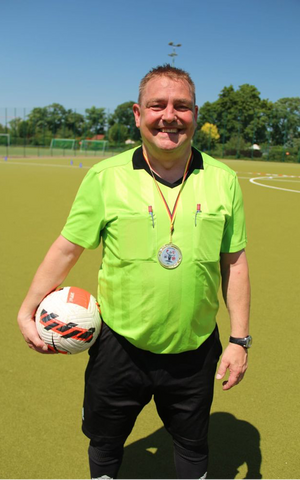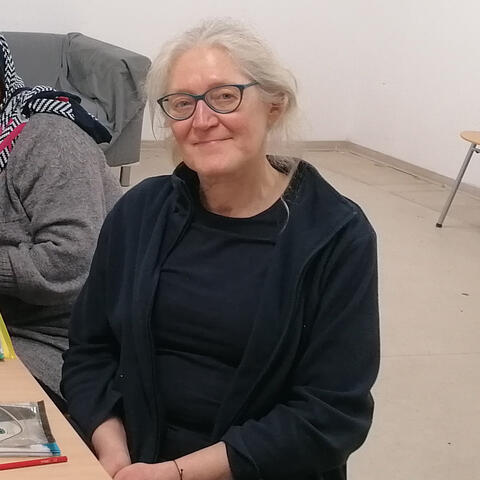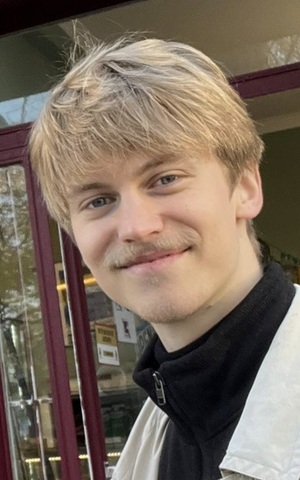Our everyday heroes
From know-it-all to rule enforcer
Christian Grande, utility cleaner
Christian was awarded a medal for being the best referee in his age group in 2023.
I joined BSC Rehberge as a player in 1986. Even back then, I was known for always “knowing better.” Today, many years later, I've been trained to do just that — as a referee. Last year, I was voted the best referee in my age group for 2023. Yes, referees also have their own tournaments where they can compete against each other. Today, I referee games that are at a higher level of play.
In my career as a referee, I have experienced some dicey situations. I was once assigned as the second assistant referee at a match. During the game, someone was sent off the field for loudly criticizing our performance. Afterwards, he kept insulting me, and I would have liked to throw my flag over his head — but I remained calm. A referee observer was keeping a constant eye on us that day.
After the final whistle, we went into the dressing room and the observer praised me for not reacting — despite everything the man had said to me. Since then, I've never let anyone talk me into anything, and I insist on adhering to the rules. There's peace and calm on the field today, because without a referee, there's no game!
Language connects
Marion leads a learning and discussion group for refugee women.
Marion Rösch, technical assistant in the diagnostics laboratory of the animal facility
About once a week, I visit the refugee home in Buch for two hours, where I meet with the refugee women to practice German. It's clear to me: without language skills, integration is difficult — whether it's finding a job, looking for housing or establishing new social contacts. Many residents hardly ever leave their familiar surroundings, even though they have lived here for years. They need people to take them by the hand and help them find their way in their new home.
That's why I help the women with their German homework and talk to them. Some of them never had the opportunity to go to school in Afghanistan or Iran, let alone learn to read and write. This presents them with major challenges in the integration language courses. Many are desperate and discouraged. Teachers often don't have enough time or patience. And they often lack understanding.
It's not about being technically and grammatically perfect. Talking together about everyday things and their worries is much more important.
It's about interpersonal relationships, attention, and having fun. As a thank you, some residents bring me something they've cooked themselves or spontaneously invite me to break the fast with them.
Working in the mud
The large pump operated by Frank Büttner can pump 5,000 liters of water per minute. This means that every second about as much water flows through the pump as would fit into a half-filled bathtub.
Frank Büttner, staff in corporate IT
When I was in my late 20s and early 30s, I thought a lot about how I could get more involved in society. The “Technisches Hilfswerk” (THW) in Treptow-Köpenick was the answer. For more than ten years, I've spent a few days annually working in flooded areas. While many helping hands are out there shoveling mud or stacking sandbags, I tend to provide support on the technical side. I take care of the large pumps that can only be operated by experts.
There have been many moments during my assignments that touched me. Unfortunately, I can't tell you everything in detail, to protect the privacy of the victims. But I can say one thing: the gratitude of the local people is incredible. Whether during the great flood of 2013 or current operations such as the Zoltan mission — the teamwork of THW colleagues, from the nurses to the welders, often leads to amazing solutions to the problems on the ground. The Max Delbrück Center fully supports me in my commitment. I am very grateful for that. Unfortunately, that's not a given with all employers.
Tales that stick
Dr. Inga Patarčić, Data Science Manager
Inga’s journey in storytelling began with a climbing accident that she fortuitously survived. Reflecting on this pivotal moment, she shared her story, themed around the concept of “Gravity,” with an audience at Berlin's Science Week in 2018.
I firmly believe that storytelling can save lives. Overcoming doubts, I shared a story about a climbing accident during Berlin Science Week in 2018 on the theme of 'Gravity.' That story ended up being published in a top climbing magazine. Writing about that episode not only helped me process the events but also resonated deeply with others.
Since then, I've made it a habit to share my stories on social media – tales of break-ups and losses, immigration and refugee experiences, or health conditions such as my infection with human papilloma virus (HPV). And every now and then, I get messages from women from all of the world, who've seen my stories, seeking advice and reassurance. They'll say things like, "I just got diagnosed with Cervical Intraepithelial Neoplasia (CIN) too. Does this mean I have cancer?" Or, "I read that HPV is linked to cervical cancer. Does that mean I'm at high risk?”
Of course, the answer to all these questions is "No." HPV doesn't mean your life is over. I try to calm them down, advise them against excessive Googling, and help them understand their results. It's essential to provide accurate information and support those women by raising awareness about HPV vaccines. Did you know that many German public or private health insurances cover HPV vaccines, even if you are older than 18? If my words can encourage even one woman to get vaccinated, then I consider that a major win.
Tech for everyone
Fabian Janosch Krüger, PhD student in the lab of Dr. Altuna Akalin
Fabian is part of a Europe-wide network of volunteers who offer free digital education.
As an active member of TechLabs e.V. in Berlin, I am committed to free digital education in the tech sector. Here I coordinate workshops, give talks and am available to participating “Techies” as a point of contact. A few years ago, I furthered my education in data science and artificial intelligence there myself. This experience not only enriched my master's thesis, but also paved my way to the Max Delbrück Center, where I am now a doctoral candidate. I have experienced first-hand the positive impact TechLabs can have on people's lives. That's why I want to give something back to the community I've learned so much from.
During the current semester one group of techies is particularly close to my heart. Through a cooperation with the bee4change association, some girls from Afghanistan are participating online in our program. They’re learning how to develop apps and websites. In a country ruled by the Taliban, as women they have hardly any access to education. Our program is an important opportunity for them to further their education, and often we are the only male individuals they have contact with outside their families. Despite the challenges with the power supply and unstable internet, they are doing great and keeping on top of things.
The gratitude that my team and I get back shows me time and again how important our work is. It is a matter of the heart for me to give other people the chance as well to have a better life, and I am happy to dedicate my spare time to this.
Support for sport
Antonia Klein (l.) and Kirstin Bodensiek (r.) as course marshals at the VeloCity Berlin 2023 road bike race.
Kirstin Bodensiek, head of the legal department, and Antonia Klein, innovation and technology manager
My colleague Antonia and I are not only happy to be active ourselves, but also enthusiastic volunteers at sporting events. From volunteering at running events to the Special Olympics, there are many opportunities to get involved. Experiencing the organization behind the scenes and being so close to the athletes is very interesting. You meet very different people and sometimes you even make new friends in the process!
Whether we are competing as athletes ourselves or as helpers, the energy of the participants and volunteers is contagious. This way, we play our part in making big events such as the Berlin Marathon or road bike races possible.
The tasks of a volunteer are varied — from securing the roads and accrediting the press to supplying the athletes with drinks. Every move counts and is appreciated. Actually all tasks are exciting. Antonia will support ticket control at the Olympic Stadium during the next European Football Championships. She actually applied to ceremony program to prepare the fans, teams, and spectators for a football match in the stadium. Maybe she’ll get her chance at the next big event in Berlin.










